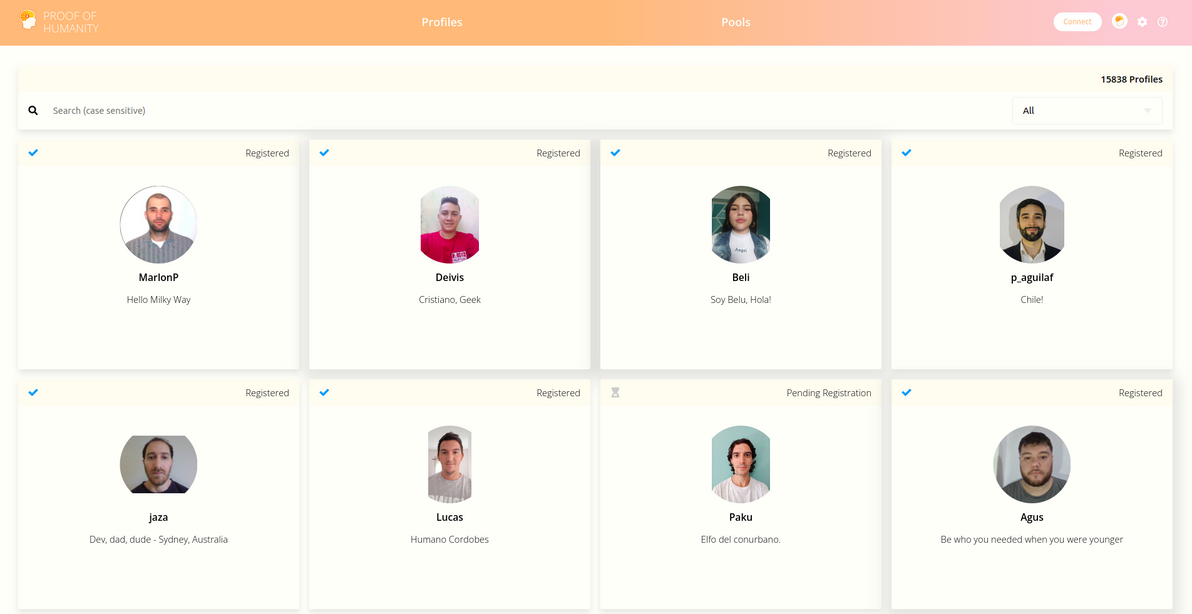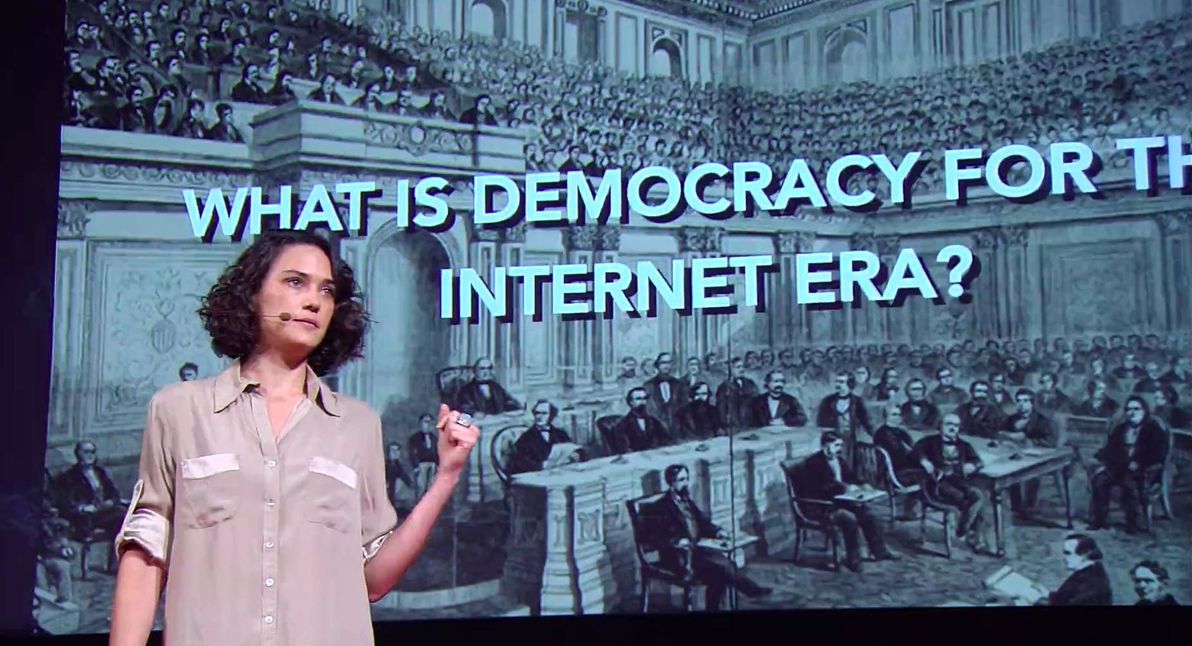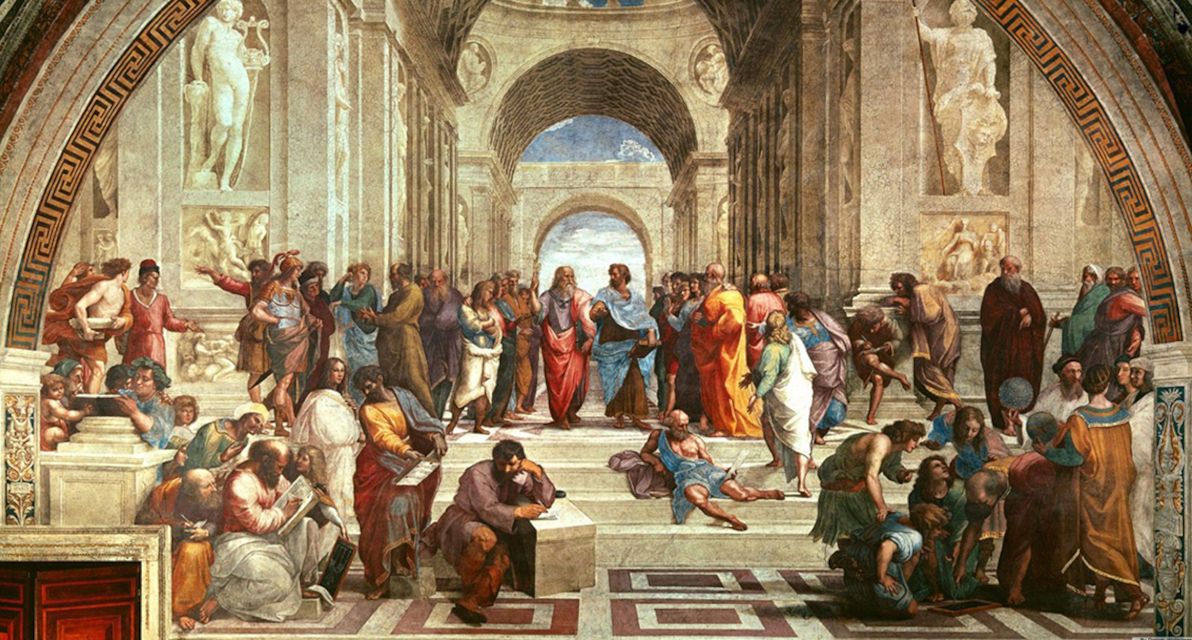Just for fun, I registered myself, so I'm now part of that tiny minority who, according to PoH, are verified humans! (Sorry, I guess the rest of you are just an illusion).

This is a brief musing on the PoH project: its background story, the people behind it, the technology powering it, the socio-economic philosophy behind it, the challenges it's facing, whether it stacks up, and what I think lies ahead.
The story
Most people think of Proof of Humanity in terms of its technology. That is, as a cryptocurrency thing, because it's all built on the Ethereum blockchain. So, yes, it's a crypto project. But, unlike almost every other crypto project, it has little to do with money (although some critics disagree), and everything to do with democracy.
The story begins in 2012, in Buenos Aires, Argentina (a part of the world that I know well and that's close to my heart), when an online voting platform called DemocracyOS was built, and when Pia Mancini founded a new political party called Partido de la Red, which promised it would vote in congress the way constituents told it to vote, law by law (similar to many pirate parties around the world). In 2014, Pia presented all this in a TED talk.

Image source: TED
DemocracyOS – which, by the way, is still alive and kicking – has nothing to do with crypto. It's just a simple voting app. Nor does it handle identity in any innovative way. The pilot in Argentina just relied on voters providing their official government-issued ID documents in order to vote. DemocracyOS is about enabling direct democracy, giving more people a voice, and fighting corruption.
In 2015, Pia Mancini and her partner Santiago Siri – along with Herb Stephens – founded Democracy Earth, which is when crypto entered the mix. The foundation's seminal paper "The Social Smart Contract" laid down (in exhaustive detail) the technical design for a new voting platform based on blockchain. The original plan was for the whole thing to be built on Bitcoin (Ethereum was brand-new at the time).
(Side note: the Democracy Earth paper was actually the thing that I stumbled across, while googling stuff related to direct democracy and liquid democracy. It was only that paper, that then led me to discover Proof of Humanity.)
To make the voting platform feasible, the paper argued, a decentralised "Proof of Identity" solution was needed – the design that the paper spells out for such a system, is clearly the "first draft" of what would later become Proof of Humanity. The paper also presents the spec for a universal basic income being paid to everyone on the platform, which is one of the key features of PoH today.
When Pia and Santiago welcomed their daughter Roma Siri into the world in 2015, they gave her the world's first ever "blockchain valid birth certificate" (using the Bitcoin blockchain). The declaration stated verbally in the video, and the display of the blockchain address in the visual recording, are almost exactly the same as the declaration and the public key that are present in the thousands of PoH registration videos to date.

The original plan was for Democracy Earth itself to build a blockchain-based voting platform. Which they did: it was called Sovereign, and it launched in 2016. Whereas DemocracyOS enables direct democracy, Sovereign takes things a step further, and enables liquid democracy.
Fast-forward to 2018: Kleros, a "decentralised court", was founded by Federico Ast (another Argentinian) and Clément Lesaege (a Frenchman), all built on Ethereum. Kleros has different aims to Democracy Earth, although it describes its mission as "access to justice and individual freedom". Unlike Democracy Earth, Kleros is not a foundation, although it's not a traditional for-profit company either.

Image source: Twitter
And fast-forward again to 2021. Proof of Humanity is launched, as an Ethereum Dapp ("decentralised app"). Officially, PoH is independent of any "real-life" people or organisations, and is purely governed by a DAO ("decentralised autonomous organisation").
In practice, the launch announcements are all published by Kleros; the organisations behind PoH are recognised as being Kleros and Democracy Earth; Clément Lesaege and Santiago Siri are credited as the architects of PoH; and the PoH DAO's inaugural board members are Santiago Siri, Herb Stephens, Clément Lesaege, and Federico Ast.
The main selling point that PoH has pitched so far, is that everyone who successfully registers receives a stream of UBI tokens, which will (apparently!) reduce world poverty and global inequality.
PoH participants are also able to vote on "HIPs" (Humanity Improvement Proposals) – i.e. proposed changes to the PoH smart contract, so basically, equivalent to voting on pull requests for the project's main codebase – I've already cast my first vote. Voting is powered by Snapshot, which appears to be the successor platform to Sovereign – but I'm waiting for someone to reply to my question about that.
PoH is still in its infancy. It doesn't even have a Wikipedia page yet. I wrote a draft Proof of Humanity Wikipedia page, but, despite a lengthy argument with the moderators, I wasn't able to get it published, because apparently there's still insufficient reliable independent coverage of the project. You're welcome to add more sources, to try and satisfy the pedantic gatekeepers over there.
Challenges
By far the biggest challenge to the growth and the success of Proof of Humanity right now, is the exorbitant transaction fees (known as "gas fees") charged by the Ethereum network. Considering that its audience is (ostensibly) every human on the planet, you'd think that registering with PoH would be free, or at least very cheap. Think again!
You have to pay a deposit, which is currently 0.125 ETH (approximately $400 USD), and which is refunded once your profile is successfully verified (and believe me or not, but I'm telling you from personal experience, they do refund it). That amount isn't trivial, even for a privileged first-worlder like myself.
But you also, in my personal experience, have to pay at least another 10% on top of that (i.e. 0.012 ETH, or $40 USD), in non-refundable gas fees, to cover the estimated processing power required to execute the PoH smart contract for your profile. Plus another 10% or so (could well be more, depending on your circumstances) if you need to exchange fiat money for Ethereum, and back again, in order to pay the deposit and to recover it later.

Image source: Obscure Train Movies
So, a $400 USD deposit, which you lose if your profile is challenged (and your appeal fails), and which takes at least a week to get refunded to you. Plus $80 USD in fees. Plus it's all denominated in a highly volatile cryptocurrency, whose value could plummet at any time. That's a pretty steep price tag, for participation in "a cool experiment" that has no real-world utility right now. Would I spend that money and effort again, to renew my PoH profile when it expires in two years' time? Unless it gains some real-world utility, probably not.
Also a major challenge, is the question of how to give the UBI tokens any real value. UBI can be traded on the open market (although the only exchange that actually allows it to be bought and sold right now is the Argentinian Ripio). When Proof of Humanity launched in early 2021, 1 UBI was valued at approximately $1 USD. Since then, its value has consistently declined, and 1 UBI is now valued at approximately $0.04 USD.
UBI is highly inflationary by design. Every verified PoH profile results in 1 UBI being minted per hour. So every time the number of verified PoH profiles doubles, the rate of UBI minting doubles. And currently there's zero demand for UBI, because there's nothing useful that you can do with it (including investing or speculating in it!). The PoH community is actively discussing possible solutions, but there's no silver bullet.
To top it all off, it's still not clear whether or not PoH will live up to its purported aim, which is to create a Sybil-proof list of humans. The hypothesis underpinning it all, is that a video submission – featuring visual facial movement, and verbal narration – is too high a bar for AI to pass. Deepfake technology, while still in its infancy, is improving rapidly. PoH is betting on Deepfake's capability plateauing below that bar. Time will tell how that gamble unfolds.
PoH is also placing enormous trust in each member of the community of already-verified humans, to vet new profile submissions as representing real, unique humans. It's a radical and unproven experiment. That level of trust has traditionally been reserved for nation-states and their bureaucracies. There are defences built-in to PoH, but time will tell how resilient they are.
Musings
I'm not a crypto guy. The ETH that I bought in order to pay the PoH deposit, is my first ever cryptocurrency holding (and, in keeping with conservative mainstream advice, it's a modest amount, not more than I can afford to lose).
My interest in PoH is from a democratic empowerment point of view, not from a crypto nor a financial point of view. The founders of PoH claim to have the same underlying interest at heart. If that's so, then I'm afraid I don't really understand why they built it all on top of Ethereum, which is, at the end of the day, a financial instrument.

Image source: The University of Queensland
Sure, the PoH design relies on hash proofs, and it requires some kind of blockchain. But they could have built a new blockchain specifically for PoH, one that's not a financial instrument, and one that's completely free as in beer. Instead, they've built a system that's coupled to the monetary value of, at the mercy of the monetary fees of, and vulnerable to the monetary fraud / scams of, the underlying financial network.
Regarding UBI: I think I'm a fan of it – I more-or-less wrote a universal basic income proposal myself, nine years ago. Not unlike what PoH has done, I too proposed that a UBI should be issued in a new currency that's not controlled by any sovereign nation-state (although what I had in mind was that it be governed by some UN-like body, not by something as radical as a DAO).
However, I can't say I particularly like the way that "self-sovereignty" and UBI have been conflated in PoH. I would have thought that the most important use case for PoH would be democratic voting, and I feel that the whole UBI thing is a massive distraction from that. What's more, many of the people who have registered with PoH to date, have done so hoping to make a quick buck with UBI, and is that really the group of people we want, as the pioneers of PoH? (Plus, I hate to break it to you, all you folks banking on UBI, but you're going to be disappointed.)
So, do I think PoH "stacks up"? Well, it's not a scam, although clearly all the project's founders are heavily invested in crypto, and do stand to gain from the success of anything crypto-related. Call me naïve, but I think the people behind PoH are pure of heart, and are genuinely trying to make the world a better place. I can't say I agree with all their theories, but I applaud their efforts.

Image source: Meme Creator
And do I think PoH will succeed? If it can overcome the critical challenges that it's currently facing, then it stands some chance of one day reaching a critical mass, and of proving itself at scale. Although I think it's much more likely that it will remain a niche enclave. I'd be pleasantly surprised if PoH reaches 5 million users, which would be about 0.1% of internet-connected humanity, still a far cry from World Domination™.
Say what you will about it, Proof of Humanity is a novel, fascinating idea. Regardless of whether it ultimately succeeds in its aims, and regardless of whether it even can or should do so, I think it's an experiment worth conducting.
]]>